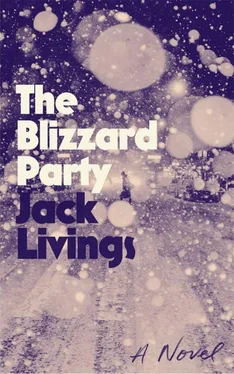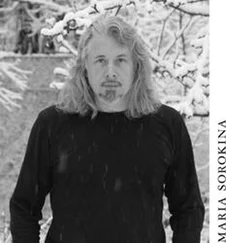He’d pulled the same thing on flights for London, Bonn, a puddle jumper to Cape Cod. Sorry, he’d say, and he’d step neatly out of the boarding line and head back to the ticket desk to see what the rest of the week’s schedule looked like. Can’t go today. Just can’t. He’d refused taxis, subways, trains, ferries, trams, funiculars.
Entire buildings failed to transmit the correct vibrations. It’s the maintenance crews, he’d say. Look at their uniforms, he’d say, gesturing at some admittedly sartorially challenged guys champing on cigars in a loading bay. You think those guys sweat the details? Think they’re sticking to the checklist?
And now I remember something. He once told me that most of what is considered evil in this world is nothing more than willful apathy. We had been walking on Riverside when he’d said that, and dusk had turned the buildings across the river into silhouettes, the sky shades of violet, and the air was still but crisp, everything around us obtrusively pensive. Even the traffic had seemed to hum in harmony. I was in college. He’d been explaining simple sabotage to me, the philosophy of ignorance, both blissful and malignant.
He’d been explaining it to me all along.
* * *
We were wearing mufti, he says. Every stich of it Polish cloth. I’d had a tooth pulled and replaced with a cyanide tooth.
What? I say.
He opened his mouth and inserted a finger. You know, a hollow molar, here, this one, he says. You remember, you old southpaw?
I nod, thinking, Yes, I do. Of course I do. How strange that you’d return to the night of the party, the night I sent your tooth down the heating vent.
We rendezvoused with the partisans, he says, who took us to a farmhouse about fifty miles from Markstädt. The idea was that we’d travel during the day in a horse cart loaded with sausage. Traveling at night was too suspicious. The partisans drilled us on every aspect of making krupniok before they’d let us set foot outside that farmhouse. Standard protocol because the Nazis were by then well attuned to the rhythms of a cover story. The day I’d arrived in London I’d been given a rusty knurled pipe and told to work it every night before bed so that I’d develop calluses. Can’t claim to be a peasant with ivory palms. The Germans took note of these things. Neither Tad nor I had bathed in weeks. Our toenails were the appropriate shade of green. Our teeth were mossy.
Even on the open road, nothing but farmland for miles around us, Tad and I spoke Polish. We discussed nothing but the sausage and the details of our cover story. To be anything less than one hundred percent Polish was to ensure exposure and execution. The Germans at the checkpoints were only too happy to liberate us of some of our cargo. This was by design, smart thinking on the part of our minders, and we’d been given explicit instructions to complain, but not too much—just the right amount of hopeless griping. We had letters from our cousins, we had our papers, everything was in order. They waved us through. Off to see our family in Markstädt, heil Hitler.
We arrived and made contact with the partisans there, our cousins who’d sent word that there’s work for us in town. We spent a couple of weeks selling sausage in the town market, letting everyone get a good look at us. Our cousins introduced us around. I got on as an apprentice to a master electrician who was part of the resistance.
I carried out my mission according to my training. Identify the disaffected, the bellyachers, and cultivate their sense of discomfiture. The Polish tradesmen were my primary marks. There was a pub where we all went for beer on Saturdays. Of course there were Germans there, too. We Poles played skat and drank and slowly, bit by bit, I formed bonds. A word here or there. It wasn’t uncommon to commiserate about the rotten szkopy sitting five feet away, just over at the bar, and after a while I could capitalize on that. The trick was to find the Pole whose hatred of the Germans was at a low boil, a pot that required only a touch more heat to froth over. He might, in passing, tell you what kept him up at night, staring into the dark. A couple of weeks later, he’d mention it again. Then you find out the Nazis had shot his brother or sent his father to a work camp. Everyone had been affected, but a family tragedy at the hands of the Waffen SS, for instance—well, there you had your opening. You’d think the anger that came from having the Nazis squatting over your country, showering you with excrement day and night, would be enough. But there had to be something more. Because you could endure the rest. If the scalpel cuts slowly enough, you might not even feel the extraction of your most dearly held beliefs. Abnormality repeated becomes the norm. But the single traumatizing event, that’s what breaks us, isn’t it? You know this.
My father looks at me with terrible sympathy. His face. My father’s kind face.
It’s only a trauma if you can’t process it, I say.
Like a computer? my father says.
I have this on good authority, I say. The best shrinks on the island have delivered their opinions. If you can’t stop reliving it, it’s trauma. I don’t relive it. I just miss Vik.
Of course, he says. Different for me, you see. My father taps his head. Bad input. Faulty wiring.
So, I played the dutiful apprentice, he says, all the while gathering intelligence and identifying my marks. Within a couple of months I had contacts in seven factories at Gross-Rosen. I adhered to my training, cultivated relationships, and hoped I could lead a few of them to some minor acts of sabotage. You touch a spark to kindling, and if conditions are right, the fire spreads.
But I had no way of knowing if my efforts were doing any good. It wasn’t like a bombing raid, with quantifiable successes defined by installations neutralized stroke body count. At best, I got something anecdotal from my marks, probably just bragging. I decided I needed to get inside a factory myself to assess the situation. This was a stupid idea, and my compatriots told me as much, but I persisted.
At the Berthawerke, the Krupp factory that made howitzers, there was a Pole, originally from Lodz, who had an administrative job. A bookkeeper. He was sympathetic to the cause—he’d been the one who’d passed along the letter that had landed me in Poland in the first place. He’d told us that after the administrative purge a new SS unit had been brought in, more SS guards who’d worked for Krupp in Essen, and their Polish was bad, which I knew would give me extra cover. The foremen on the factory floor were German, so the same held for them. They only spoke basic Polish.
The bookkeeper was staunchly against my plan. It was ludicrous and he told me so. The first thing he explained to me was that the factory’s production hadn’t improved an iota since the new administration’s takeover. In fact, escape attempts were up, and the Russian POWs were running their own sabotage schemes. So what’s there for you to see? he wants to know. Whatever you need to know, he says, I’ll tell you! The Berthawerke was a crap factory, the German staff continually on report for loafing. The foremen purposely trained their underlings poorly, did whatever they could to make sure that materials and tools were mishandled. You see, if a worker showed some talent for a job, he might have become foreman himself—not a Jew, of course, but there were German prisoners, Eastern workers, the Russians. Self-preservation dictated that the foremen keep production low.
This is a fool’s errand, this bookkeeper tells me. If anything, you’ll be a danger to the prisoners. You’ll ruin whatever plans they’ve already laid.
Obviously he didn’t think much of me, and for good reason. I was only a kid, after all, and had done nothing to earn his respect. Simply setting foot on the floor, he tells me, you put the entire resistance in danger. He would yell at me: You’re a child! You have no idea what goes on in a place like this!
Читать дальше












